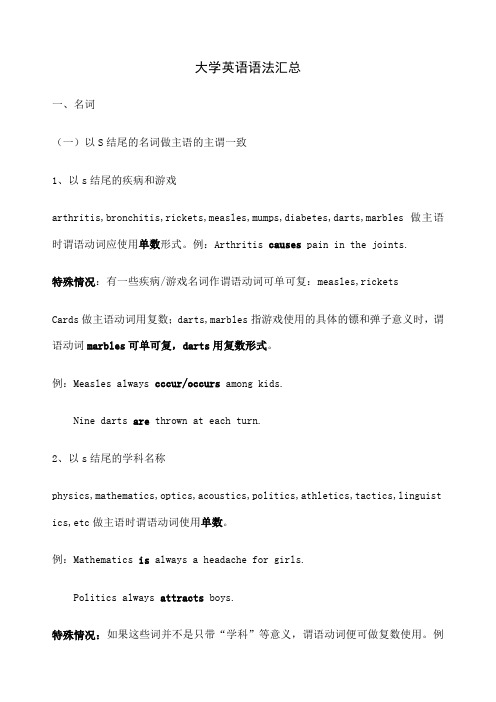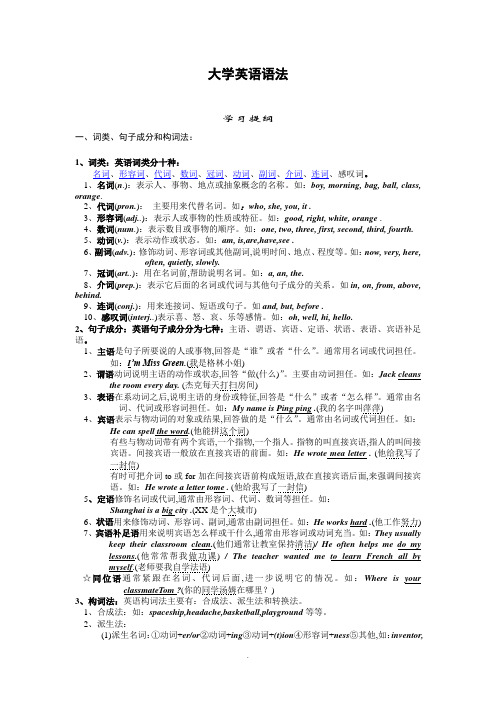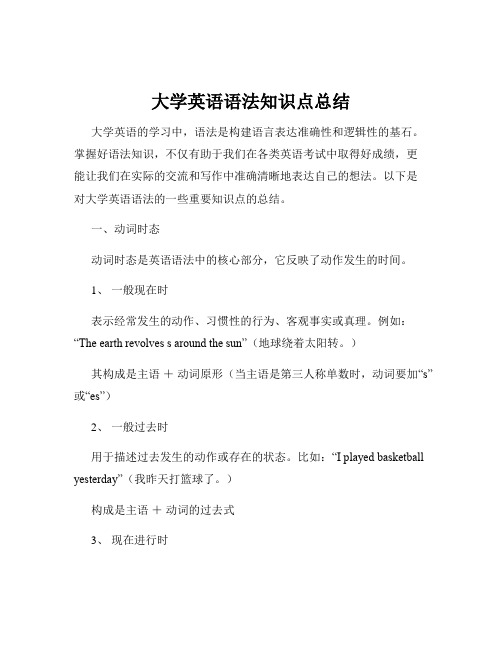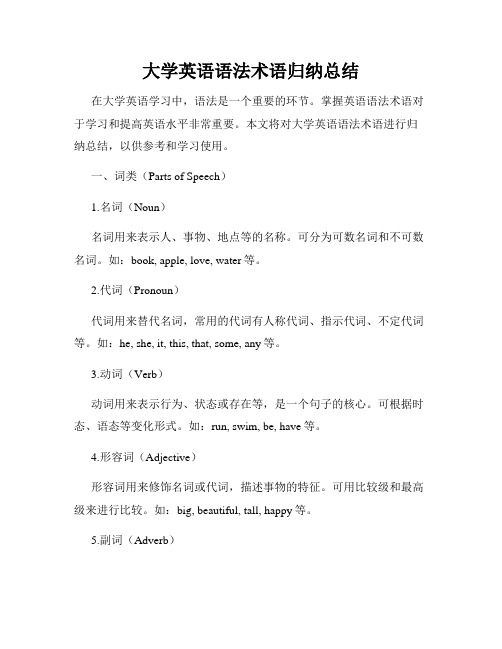大学英语语法汇总
大学英语语法汇总

大学英语语法汇总一、名词(一)以S结尾的名词做主语的主谓一致1、以s结尾的疾病和游戏arthritis,bronchitis,rickets,measles,mumps,diabetes,darts,marbles做主语时谓语动词应使用单数形式。
例:Arthritis causes pain in the joints.特殊情况:有一些疾病/游戏名词作谓语动词可单可复:measles,ricketsCards做主语动词用复数;darts,marbles指游戏使用的具体的镖和弹子意义时,谓语动词marbles可单可复,darts用复数形式。
例:Measles always cccur/occurs among kids.Nine darts are thrown at each turn.2、以s结尾的学科名称physics,mathematics,optics,acoustics,politics,athletics,tactics,linguist ics,etc做主语时谓语动词使用单数。
例:Mathematics is always a headache for girls.Politics always attracts boys.特殊情况:如果这些词并不是只带“学科”等意义,谓语动词便可做复数使用。
例如,mathematics运算能力,athletic体育运动,acoustics音响效果,tactics策略,economics经济学意义。
例:The acoustics in Bon Jovi’s Tulsa concert were beyond criticism last spring.3、以s结尾的地理名称The States,the united states,the Netherlands,the Philippines,the United Arab Emirates,the United Nation做主语时,谓语动词使用单数。
大学生专业英语语法总结

大学生专业英语语法总结大学生学习英语需要掌握语法,因为语法是英语的基础。
在英语学习过程中,专业英语语法更是不可或缺的一部分。
本文将总结大学生学习专业英语语法的一些重要知识点。
一、基本时态英语时态是英语语法中非常重要的一部分。
大学生学习英语时,最先需要掌握的是基本时态,它包括:现在简单时态、过去简单时态、将来简单时态等。
现在简单时态:表示现在的状态、经常性的动作或真理等,如“I eat breakfast every morning.”(我每天早上吃早餐)过去简单时态:表示过去某个时间发生的事情,如“I played soccer yesterday.”(我昨天踢足球了)将来简单时态:表示将要发生的动作或事件,如“We will have a meeting tomorrow.”(我们明天将开会)二、主谓一致主语与谓语在人称和数上要相一致,这个在语法中叫主谓一致。
通常,当主语为单数时,谓语动词也应该是单数形式,当主语为复数时,谓语动词也应该是复数形式。
例如:“This boy loves playing basketball.”(这个男孩喜欢打篮球)“These boys love playing basketball.”(这些男孩喜欢打篮球)三、被动语态被动语态对于大学生来说也是十分重要的一部分。
被动语态的作用是把主语从动作的执行者转化为动作的承受者,主语一般为句子中的物,而不是动作的执行者。
被动语态的构成方式是:be动词(am、is、are、was、were)+动词的过去分词形式。
例如:“The paper was written by her.”(这篇文章是她写的)四、定语从句定语从句是用来修饰某个名词或代词的句子,是英语语法中很重要的一部分。
定语从句应该放在被修饰的名词或代词后面,用关系代词引导,例如:“The teacher who is standing over there is my math teacher.”(那个站在那边的老师是我的数学老师)五、虚拟语气虚拟语气指的是表示与事实相反的假设情况的语气,是英语语法中较难的一部分。
大学英语语法总结(全面)

大学英语语法总结(全面)大学英语语法总结(全面完整版)1. 介词(Prepositions)- 表示地点:at, in, on- 表示时间:at, in, on- 表示方式:by, with- 表示原因:because of, due to- 表示目的:for, to2. 冠词(Articles)- 定冠词:the- 不定冠词:a, an3. 代词(Pronouns)- 主格代词:I, you, he, she, it, we, they- 宾格代词:me, you, him, her, it, us, them- 所有格代词:my, your, his, her, its, our, their- 反身代词:myself, yourself, himself, herself, itself, ourselves, themselves4. 名词(Nouns)- 单数名词:book, chair, dog- 复数名词:books, chairs, dogs- 不可数名词:water, money, information5. 动词(Verbs)- 一般现在时:I walk, you walk, he/she/it walks, we walk, they walk- 一般过去时:I walked, you walked, he/she/it walked, we walked, they walked- 现在进行时:I am walking, you are walking, he/she/it is walking, we are walking, they are walking- 过去进行时:I was walking, you were walking, he/she/it was walking, we were walking, they were walking- 一般将来时:I will walk, you will walk, he/she/it will walk, we will walk, they will walk6. 形容词(Adjectives)- 描述名词特征:big, small, tall- 比较级:bigger, smaller, taller- 最高级:biggest, smallest, tallest7. 副词(Adverbs)- 表示方式:quickly, slowly- 表示程度:very, extremely- 表示时间:now, yesterday8. 连词(Conjunctions)- 表并列:and, or- 表递进:furthermore, moreover- 表转折:however, but- 表原因:because, since以上是大学英语语法的简要总结,希望对你有帮助。
大学英语语法大全(最新整理)

大学英语语法学习提纲一、词类、句子成分和构词法:1、词类:英语词类分十种:名词、形容词、代词、数词、冠词、动词、副词、介词、连词、感叹词。
1、名词(n.):表示人、事物、地点或抽象概念的名称。
如:boy, morning, bag, ball, class, orange.2、代词(pron.):主要用来代替名词。
如:who, she, you, it .3、形容词(adj..):表示人或事物的性质或特征。
如:good, right, white, orange .4、数词(num.):表示数目或事物的顺序。
如:one, two, three, first, second, third, fourth.5、动词(v.):表示动作或状态。
如:am, is,are,have,see .6、副词(adv.):修饰动词、形容词或其他副词,说明时间、地点、程度等。
如:now, very, here,often, quietly, slowly.7、冠词(art..):用在名词前,帮助说明名词。
如:a, an, the.8、介词(prep.):表示它后面的名词或代词与其他句子成分的关系。
如in, on, from, above, behind.9、连词(conj.):用来连接词、短语或句子。
如and, but, before .10、感叹词(interj..)表示喜、怒、哀、乐等感情。
如:oh, well, hi, hello.2、句子成分:英语句子成分分为七种:主语、谓语、宾语、定语、状语、表语、宾语补足语。
1、主语是句子所要说的人或事物,回答是“谁”或者“什么”。
通常用名词或代词担任。
如:I’m Miss Green.(我是格林小姐)2、谓语动词说明主语的动作或状态,回答“做(什么)”。
主要由动词担任。
如:Jack cleansthe room every day. (杰克每天打扫房间)3、表语在系动词之后,说明主语的身份或特征,回答是“什么”或者“怎么样”。
大学英语语法知识点总结

大学英语语法知识点总结大学英语的学习中,语法是构建语言表达准确性和逻辑性的基石。
掌握好语法知识,不仅有助于我们在各类英语考试中取得好成绩,更能让我们在实际的交流和写作中准确清晰地表达自己的想法。
以下是对大学英语语法的一些重要知识点的总结。
一、动词时态动词时态是英语语法中的核心部分,它反映了动作发生的时间。
1、一般现在时表示经常发生的动作、习惯性的行为、客观事实或真理。
例如:“The earth revolves s around the sun”(地球绕着太阳转。
)其构成是主语+动词原形(当主语是第三人称单数时,动词要加“s”或“es”)2、一般过去时用于描述过去发生的动作或存在的状态。
比如:“I played basketball yesterday”(我昨天打篮球了。
)构成是主语+动词的过去式3、现在进行时表示正在进行的动作。
像:“He is reading a book now”(他正在读书。
)结构为:主语+ be 动词(am/is/are)+动词的现在分词4、过去进行时强调过去某个时刻正在进行的动作。
例如:“I was doing myho mework at 8 o'clock last night”(昨晚八点我正在做作业。
)其形式为:主语+ was/were +动词的现在分词5、现在完成时表示过去发生的动作对现在造成的影响或结果,或者过去的动作一直持续到现在。
例如:“I have finished my work”(我已经完成了工作。
)由“主语+ have/has +动词的过去分词”构成6、过去完成时表示过去某一时间或动作之前已经发生或完成的动作。
例如:“By the end of last year, I had learned 5000 words”(到去年年底,我已经学了5000 个单词。
)结构为:主语+ had +动词的过去分词7、一般将来时用以表达将来要发生的动作或存在的状态。
大学英语语法术语归纳总结

大学英语语法术语归纳总结在大学英语学习中,语法是一个重要的环节。
掌握英语语法术语对于学习和提高英语水平非常重要。
本文将对大学英语语法术语进行归纳总结,以供参考和学习使用。
一、词类(Parts of Speech)1.名词(Noun)名词用来表示人、事物、地点等的名称。
可分为可数名词和不可数名词。
如:book, apple, love, water等。
2.代词(Pronoun)代词用来替代名词,常用的代词有人称代词、指示代词、不定代词等。
如:he, she, it, this, that, some, any等。
3.动词(Verb)动词用来表示行为、状态或存在等,是一个句子的核心。
可根据时态、语态等变化形式。
如:run, swim, be, have等。
4.形容词(Adjective)形容词用来修饰名词或代词,描述事物的特征。
可用比较级和最高级来进行比较。
如:big, beautiful, tall, happy等。
5.副词(Adverb)副词用来修饰动词、形容词、其他副词等,用于描述行为方式、程度、时间等。
如:quickly, very, soon, often等。
6.介词(Preposition)介词用来表达位置、方向、时间、原因等关系,常与名词或代词搭配使用。
如:in, on, at, for, with等。
7.连词(Conjunction)连词用来连接词语、短语、从句等,使句子结构更加完整。
如:and, but, or, because等。
8.感叹词(Interjection)感叹词用来表达强烈的情感或意见,常用于口语交流中。
如:oh, wow, yes, no等。
二、句子成分(Sentence Elements)1.主语(Subject)主语是一个句子中的核心,通常是一个名词或代词。
如:I, he, the dog, my sister等。
2.谓语(Predicate)谓语是一个句子中的动词或动词短语,用来描述主语的动作或状态。
大学英语语法结构分析知识点汇总

大学英语语法结构分析知识点汇总大学英语的学习中,语法结构的掌握至关重要。
它不仅是理解英语句子和文章的基础,也是正确表达自己思想的关键。
以下为大家汇总了一些重要的大学英语语法结构分析知识点。
一、句子成分句子成分包括主语、谓语、宾语、定语、状语和补语。
主语通常是句子所描述的主体,一般是名词、代词或相当于名词的短语或从句。
例如:“The book is interesting”(这本书很有趣。
)中,“The book”就是主语。
谓语则是表示主语动作或状态的部分,通常是动词。
像“ He studies hard”(他学习努力。
)里,“studies”就是谓语。
宾语是动作的对象,常为名词、代词等。
比如“ She loves music”(她喜欢音乐。
)中,“music”就是宾语。
定语用于修饰名词或代词,比如“ The beautiful girl is my sister”(那个漂亮的女孩是我妹妹。
),“beautiful”就是定语。
状语用来修饰动词、形容词、副词或整个句子,说明时间、地点、原因、方式等。
例如“ He runs fast in the park”(他在公园里跑得很快。
),“fast”和“in the park”都是状语。
补语则是对主语或宾语进行补充说明,比如“ The flower smells sweet”(这花闻起来很香。
),“sweet”就是补语。
二、名词性从句名词性从句包括主语从句、宾语从句、表语从句和同位语从句。
主语从句在句子中充当主语,例如:“What he said is true”(他说的是真的。
)宾语从句在句中作宾语,像“ I don't know where he lives”(我不知道他住哪儿。
)表语从句在系动词之后,充当表语,比如“ T he problem is whetherwe can finish it on time”(问题是我们能否按时完成。
)同位语从句用于解释说明前面的名词,例如“ The news that he won the game is exciting”(他赢得比赛的消息令人兴奋。
大学英语语法重点

二、may can might could 的异同
1. May / might 事实上的可能 2. Can / could 理论上的可能
The road may be blocked. The road can be blocked. Can he tell a lie? Yes, he may. 3. Not 否定 may /might, 否定的是句子中的主动词。 They may / might not get there on time tomorrow. They can / could not get there on time tomorrow.
三、做状语 –ing/ to
1. In order to, so as to, only to, too…to.., so … as to… 2. 悬垂
Going home, mother cooked a good meal. 3. 独立主格
Weather permitting, we will go for a picnic tomorrow. 4. -ing/-ed 主动 被动
Ought to 与should 基本类似,但强调责任、义务、应该做, 或者逻辑上的必然性时用ought to
As a student you ought to study hard. I think I should try to lose some weight. It is starry tonight; it ought to be a fine day tomorrow.
3. needn’t have done Since the meeting has been canceled, they needn’t
- 1、下载文档前请自行甄别文档内容的完整性,平台不提供额外的编辑、内容补充、找答案等附加服务。
- 2、"仅部分预览"的文档,不可在线预览部分如存在完整性等问题,可反馈申请退款(可完整预览的文档不适用该条件!)。
- 3、如文档侵犯您的权益,请联系客服反馈,我们会尽快为您处理(人工客服工作时间:9:00-18:30)。
大学英语语法汇总一、名词(一)以S结尾的名词做主语的主谓一致1、以s结尾的疾病和游戏arthritis,bronchitis,rickets,measles,mumps,diabetes,darts,marbles做主语时谓语动词应使用单数形式。
例:Arthritis causes pain in the joints.特殊情况:有一些疾病/游戏名词作谓语动词可单可复:measles,ricketsCards做主语动词用复数;darts,marbles指游戏使用的具体的镖和弹子意义时,谓语动词marbles可单可复,darts用复数形式。
例:Measles always cccur/occurs among kids.Nine darts are thrown at each turn.2、以s结尾的学科名称physics,mathematics,optics,acoustics,politics,athletics,tactics,linguistics,etc做主语时谓语动词使用单数。
例:Mathematics is always a headache for girls.Politics always attracts boys.特殊情况:如果这些词并不是只带“学科”等意义,谓语动词便可做复数使用。
例如,mathematics运算能力,athletic体育运动,acoustics音响效果,tactics策略,economics经济学意义。
例:The acoustics in Bon Jovi’s Tulsa concert were beyond criticism last spring.3、以s结尾的地理名称The States,the united states,the Netherlands,the Philippines,the United ArabEmirates,the United Nation做主语时,谓语动词使用单数。
例:The Netherlands is a Euroupean country.The Sates is a developed country特殊情况:如果主语是群岛archipelago,山脉mountains,海峡straits,瀑布waterfalls,运动会games等,谓语动词则使用复数。
例:The Nansha Islands (The Spratly Islands)are integral part of China.The Wuyi mountains are picturesque.The Olympic Games are held every four years.4、其他以S结尾的名词(1)成双成对出现的名词做主语时:例如jeans,compasses(圆规)scissors,pincers,glasses,pants,shorts,trousers,slacks,suspenders等谓语动词使用复数.例:The slacks are so completeful.The Hengdali glasses are so pricey.但是加上单位词则使用单数。
例:One pair of glasses is far from enough when you travel abroad.(2)英语中还有一些以s结尾的名词,如archives,arms,clothes,contents,eaves,fireworks,firecrackers,goods,morals,thanks等,谓语动词使用复数。
例:The firecrackers are so loud.Many thanks go to my wife and her floks.(3)Ings结尾的名词谓语动词一般使用复数。
如,clippings,diggings,earnings,fillings,sweepings,etc例:His earnings are pretty good.特殊情况:tidings(旧)做主语时谓语动词可单可复。
例Good tidings are cheerful.(4)英语中有一些词,单复数同形,例如barracks,headquarters,means,series,species,works,sheep,deer谓语动词根据实际情况而定。
例:This means of transportation does not work for me.This means have been tried.These endangered species are well protected in mainland China.(5)少数的名词做单数和复数时意义不一样。
例:What is the odds?(有什么要紧)The odds are in our favors.(形式对我们有利)特殊情况:Remains做“遗体”时,谓语动词使用复数,如果当“遗迹”“剩余物”时,谓语动词可单可复。
例:The prime minister’s remains were buried in the vicinity of the church.There remains of the ancient capital has been reduced to debris after the massive quake.The remains of the meal was/were fed to the dog.(二)集体名词做主语的主谓一致1、通常做复数的集体名词police,people,cattle,militia,poultry,personal,clergy,vermin等做主语时谓语动词使用复数。
例:The clergy remain divided on the issue of women priests.The personal(总称:员工)are reluctant to alter the rules.2、通常做单数的集体名词:foliage(叶子总称),machinery,equipment,furniture,merchandise,clothing(clothes),poetry(poem,poet),baggage,luggage,scenery,jewellery(jewel).例:All the machinery is made in China.The wooden furniture is unaffordable.3、可单可复的集体名词:congregation,family,government,public,crew,class,committee,audience,couple,nation,pop ulation等谓语动词根据实际情况对待。
例:The family is a large one.The family are eating salmon at table.4、A committee/panel/board of +pl. ,谓语动词通常使用单数。
例:A panel of experts is to give its opinion on ways to tackle congestion.(三)problems of concord with a coordinate subjiect1、and连接的是一个人/一件事例:The teacher and interpreter has been laid up for a couple of days.Early to bed early to rise makes a man healthy,wealthy,and wise.2、and连接成对出现的名词:knife and fork,cart and horse,needle and thread,law and order,bread and butter,ham and eggs,cereal and milk,fish and chips,pancakes and syrup,etc.例:Bread and butter is a tasty breakfast in western culture.Fish and chips is a populary take-away food that originated in the United Kingdom.3、and连接every/each/no/many a +单数名词,谓语动词使用单数。
例:Every male and every female has to evacuate from the power plant.Many a man and woman in this community finds himself or herself in need.No boy and no girl is playing tennis.4、and连接专有名词:the Stars and Stripes,the Bat and ball.例:The bat and Ball is a delightful Inn with lots of exposed beams,flagstone floors,roaring log fires & cathedral candles all creating a traditional village atmosphere. The Stars and Stripes was adopted as the flag of the United States on June 14,1777. 5、or/either...or.../not..but../not only..but also../neither..nor..连接的主语按The principle of proxiomity(就近原则)例:Either you or I am wrong.Are either you or I wrong?6、主语+as much as/rather than/more than/no less than/as well as/in additionto/with/along with/together with/except/but,etc.例:A teacher ,with his students,is watching an English movie.The king ,with the lords and commons ,constitutes their government.His cousin rather than his parents is held responsible for this inhumane massacre (四)Problems of concord with experessions of quantity as subject1、Definite Quantity(确定数量)①时间、数量、金钱、距离、重量等做主语时作为整体看待例:100 dollars means a lot to a kind of his age.300 pounds makes an obese guy.②There be 句型例外:There are 10 dollares in his pocket.③Fraction分数/percentage百分数+of,谓语动词和of后的名词保持一致例:Two thirds of the apple is rotten.Eight percent of the students have been mugged in this area.④population例Fifty-five percent of China’s population live in the rural area⑤operations运算Addition加:plus,and Aubtraction减:minus,subtracted by Multiplication乘:(multiplied)by,times Division除:divided by都可以使用单数,但是加法和乘法有时候可以用复数。
